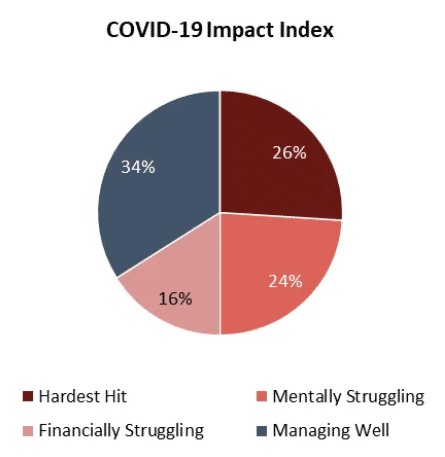
At Health Risk Services, this is our second post about Mental Health. There is no doubt about it. The COVID-19 pandemic is taking a toll on the mental health of Canadians. The combination of anxiety and isolation due to the virus and worries about finances can be overwhelming. Just how are Canadians doing?
A study released in April by the Angus Reid Institute provides a sobering picture. According to the study, “half of Canadians (50%) report a worsening of their mental health, with one-in-ten (10% overall) saying it has worsened a lot.”
Canadians are most likely to describe themselves as worried, (44%), anxious (41%) and bored (30%), although fully one-third (34%) also say they are “grateful”.
Canadians fall into four main categories as part of the Angus Reid Institute’s COVID-19 Impact Index: those who are Managing Well mentally and financially, those who are Mentally Struggling, or Financially Struggling, and those who are Hardest Hit, feeling the effects of both factors worse than anyone else.

In the “Hardest Hit” category, one-in-five residents in each region of Canada fell into this category. However, Alberta had the highest number (32%) and Quebec the lowest (20%).
COVD-19 has also impacted relationships in negative ways, with everything from loneliness and isolation for those who live alone, to increased conflict in the home due to the stress of losing jobs and managing children’s online schooling.
Sadly, more Canadians are experiencing suicidal thoughts due to the pandemic. A study by the Canadian Mental Health Association found that certain vulnerable groups were more likely to have suicidal thoughts during the pandemic, such as people who already had mental health issues, Indigenous people, individuals with a disability or who identify as LGBTQ, and parents of young children.
Those who were already struggling with their mental health are:
- twice as likely to say their mental health has declined (59% vs 33%)
- 5 times as likely to feel depressed (46% vs 17%)
- three times as likely to have trouble coping (28% vs 11%)
- four times as likely to have had suicidal thoughts (18% vs. 4%)
- four times as likely to have tried to harm themselves (4% vs. 1%)
Another group which has been dramatically affected by COVID-19 are adults with aging parents, particularly those who were in facilities where there were breakouts of the virus. They faced the additional anxiety that a parent might contract the virus, and they would not be able to visit and provide emotional support.
All of this information points to how important it is for individuals experiencing increased levels of stress, anxiety, depression, and suicidal thoughts need to be able to access a strained mental health care system in Canada.
For employers and employees, these issues are significant.
At Health Risk Services, we assist employers to be able to improve their Mental Health Offerings by providing an Employee & Family Assistance Program designed by Homewood Solutions. Health Risk Services is very honored to have a unique price offering from Homewood that allows us to add the program onto their existing plan with below market pricing.
If you would like to know more about improving or accessing mental health care benefits, please contact us at HRS. 403-236-9430













